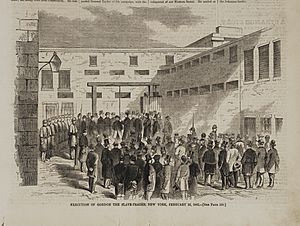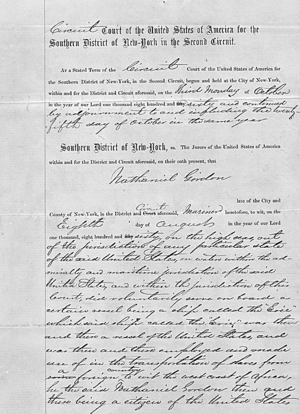Nathaniel Gordon facts for kids
Quick facts for kids
Nathaniel Gordon
|
|
|---|---|

An 1862 illustration of Gordon's execution by Harper's Weekly
|
|
| Born | February 6, 1826 Portland, Maine, U.S.
|
| Died | February 21, 1862 (aged 36) |
| Cause of death | Execution by hanging |
| Criminal status | Executed |
| Motive | Financial gain |
| Conviction(s) | Engaging in the slave trade (33 U.S.C. § 381) |
| Criminal penalty | Death |
| Details | |
| Victims | Hundreds |
|
Span of crimes
|
1851 – August 7, 1860 (allegedly did another voyage in 1848) |
| Location(s) | Atlantic Ocean, Western Africa |
| Target(s) | Africans |
|
Date apprehended
|
August 7, 1860 |
Nathaniel Gordon (born February 6, 1826 – died February 21, 1862) was an American slave trader. He was the only person in the United States to be tried, found guilty, and executed for taking part in the Atlantic slave trade. This was done under a special law called the Piracy Law of 1820.
Contents
Early Life and Family
Nathaniel Gordon was born in Portland, Maine. As he grew up, he entered the shipping business and eventually owned his own ship. He was married to Elizabeth and had a young son, also named Nathaniel.
When Gordon was 12 years old, his father was arrested. His father was accused of trying to illegally bring enslaved people into the United States. At that time, the law said this crime was like piracy and could lead to a death sentence. However, records do not show how his father's case ended, but he was not executed.
Gordon's Slave Trading Voyages
In 1848, Gordon's ship, the Juliet, was searched by the U.S. Navy. They were looking for proof of slave trading. No evidence was found, and Gordon was released. However, there were rumors that Gordon had indeed traveled to Africa, picked up a group of enslaved people, and returned to Brazil. Slavery was still legal in Brazil at that time.
The Camargo Voyage
In 1851, Gordon captained another ship called the Camargo. He sailed from Brazil to Africa. On this trip, Gordon took about 500 Africans aboard his ship. He had to be very careful to avoid naval patrol ships. Despite his efforts, a British warship chased him. After reaching Brazil and dropping off the Africans, Gordon burned his ship. He did this to destroy any evidence of his illegal activities. The Africans were taken by authorities, and some of Gordon's crew members were arrested. Gordon himself managed to escape by dressing in women's clothes.
The Ottawa and Erie Voyages
Soon after the Camargo voyage, Gordon captained the Ottawa. He made another slave trading trip to Cuba, where slavery was also legal. Many of the Africans on this voyage died due to the terrible conditions. Only about 25 percent survived the journey. After arriving in Cuba, Gordon again burned his ship to hide his actions.
In July 1860, Gordon set sail for the west coast of Africa again. On August 7, 1860, he loaded 897 enslaved people onto a ship called the Erie. This happened at Sharks Point, near the Congo River in West Africa. The very next day, August 8, 1860, the Erie was captured by the USS Mohican. This happened about 50 miles from a Cuban port.
Commander Sylvanus William Godon of the Mohican took control of the Erie. He ordered it to sail to Liberia, an American colony in West Africa. This colony was created for free black people from the United States. After that, the ship was to return to New York. In New York, the ship would be sold, and Nathaniel Gordon, along with his first mate William Warren and second mate David Hall, would face trial. Four other crewmen were also arrested and tried. They were found guilty of serving on a slave ship but not of engaging in the slave trade itself. They received small fines and short prison sentences.
Gordon's Trials
The government lawyer for New York, James I. Roosevelt, offered Gordon a deal. Gordon could pay a $2,000 fine and serve two years in prison. In return, he would have to share information about the people who funded his slave trading. However, Gordon refused this offer. He believed he would not face serious punishment and thought the deal was not good enough.
Gordon's case was delayed many times because the American Civil War was starting. By the time his trial began, a new government lawyer, Edward Delafield Smith, was in charge. Smith saw Gordon's case as a chance to become well-known. He also wanted to make an example of Gordon for all future slave traders. Smith wanted Gordon to be executed.
First and Second Trials
Gordon's first trial in New York City in June 1861 ended without a decision. The jury voted 7-5 to find him guilty, but they couldn't agree. It was rumored that some jurors had been bribed. Smith immediately pushed for a second trial. To prevent any more bribery or tampering, the government kept the jury separate from everyone else during the second trial.
During his second trial, Gordon's lawyers tried to use technical arguments that had worked in other cases. They argued:
- The federal government could not try Gordon because the Erie was not an American ship. They claimed it had been sold to people from other countries.
- Gordon himself might not be an American citizen. His mother sometimes traveled with his father, so he might have been born at sea.
- Gordon had sailed so far into the Congo River that he was in Portuguese waters. This would mean he was not under the U.S. government's power.
- Gordon was just a passenger and no longer the captain of the Erie after two Spanish men came aboard.
The judge rejected the first three arguments. The fourth argument was proven false by witnesses who testified against Gordon. On November 9, 1861, Gordon was found guilty of piracy for engaging in the slave trade. The law said this crime carried a death sentence. Gordon's execution was set for February 7, 1862.
In February 1862, the first mate William Warren and second mate David Hall pleaded guilty to less serious charges. Warren was sentenced to 8 months in prison, and Hall to 9 months. Because they had no money, they were each fined only one dollar. The judge warned Hall that he was being treated very kindly. He also said that if Hall was caught slave trading again, the punishment would be much worse.
Appeals and Execution
After Gordon was found guilty, his supporters asked President Abraham Lincoln for a pardon. Lincoln was known for being kind and often pardoning people during his time as president. However, he refused to pardon Gordon. He even refused to meet with Gordon's supporters.
Lincoln explained his decision by saying he could usually feel pity and pardon almost any crime. But he said he would never pardon someone who, for money, stole children from Africa to sell them into endless slavery.
Lincoln also wrote that he might personally prefer to let Gordon live in prison. But, he felt that for justice and the power of the law, there needed to be at least one case. This case would show that a professional slave trader, especially a white man from the North, would receive the death penalty. This was because of the countless deaths he and others like him caused to black people during the terrible sea voyages from Africa.
Lincoln did give Gordon a two-week delay of execution. This was so Gordon could prepare for his death. The new execution date was set for February 21, 1862. Gordon's last words to his executioner were: "Make short work of it now, Bill. I'm ready."
Images for kids
 | Calvin Brent |
 | Walter T. Bailey |
 | Martha Cassell Thompson |
 | Alberta Jeannette Cassell |




